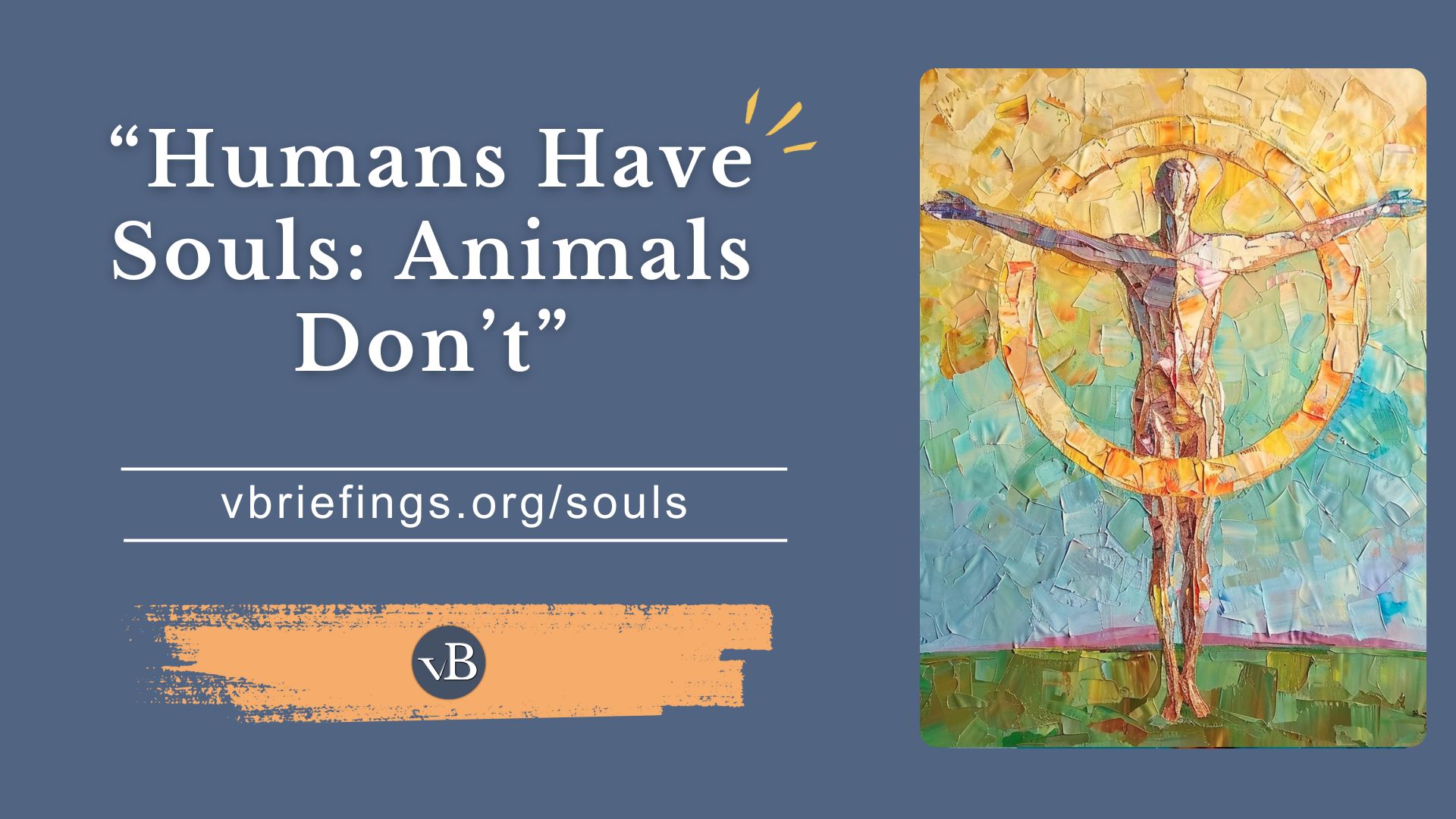Preface
Briefing description and more.
Several points to consider when evaluating the objection to veganism and animal rights based on the presence or absence of a soul.
Companion Videos
How to use companion videos
Videos may be posted on multiple social media platforms, and you can share them on each platform according each platform’s conventions.
Share this Briefing
Social Media Sharing Image
This image will be used when sharing the briefing on a social media platform. You can see all social sharing images in the grid view.

How to share this briefing
Click on the icon for the platform on which you wish to share. What happens next depends on the platform, but generally a popup will appear, letting you add your own text as you share.
Briefing Meta
Metrics
Note: we will publish additional briefings after completing flashcards and presentation slides for selected briefings.
Counts:
| Main Text | |
| Key Points | 3 |
| Counterclaims | 1 |
| Supplementary | 2 |
| Further Study | 4 |
| Footnotes | 8 |
| Media & Advocacy | |
| Advocacy Notes | 7 |
| —Socratic Questions | 10 |
| Flashcards | 27 |
| Presentation Slides | 0 |
| Memes & Infographics | 0 |
| Companion Videos | 0 |
Other Meta:
Date Posted:
Last Edited:
Edit Log:
Key Points Links
Loading…
Help Us Improve
Please send your suggestions for improvements, or report any issues with this briefing to team@vbriefings.org
We appreciate that you are taking the time to help up improve. All suggestions and reports will be carefully considered.
Summary
A concise summary of the briefing (see below for citations).
The ability to suffer is independent of having a soul, and cruelty is unjustifiable regardless of whether souls are present. While some spiritual traditions and Christian thinkers believe animals have souls, theologian C.S. Lewis suggests that animals, lacking the chance to enjoy an afterlife, are entitled to even greater compassion during their earthly lives.
Context
Places this topic in its larger context.
Religion plays a significant role in many people’s lives and shapes how they view the relationship between humans and animals. While some beliefs prioritize human dominion, others advocate compassion and interconnectedness, challenging objections to veganism that are based on the concept of a soul.
Key Points
This section provides talking points.
The existence of a soul is not relevant.
There is no logical reason having a soul should be a requirement for moral consideration. Having immortality would make a difference about what happens when our bodies die but not about how we should be treated while we are alive.
The vileness of slitting the throat of a cow, chicken, goat, or any sentient being is unrelated to whether that being has a soul. If you saw someone mercilessly kicking a dog or beating a pig with a whip, would your first thought be that this is perfectly OK because these animals do not have a soul?
Some believe that animals do have souls.
Some believe the Christian bible teaches that animals have souls.
Note: We are only relating to a Christian perspective here, as most of our readers are from predominantly Christian countries.
- Elijah D. Buckner, in his 1903 book The Immortality of Animals, concludes, “The Bible, without the shadow of a doubt, recognizes that animals have living souls the same as man.”1
- Pope John Paul II declared to a public audience in 1990 that “the animals possess a soul and men must love and feel solidarity with our smaller brethren.”2
- Job 12:10 teaches that in God’s hand “is the soul of every living thing, and the breath of all mankind.”3
Many indigenous peoples believe that animals have souls.
The absence of a soul could elicit better treatment, not worse.
Philosopher Tom Regan believes that C. S. Lewis, one of the most important Christian theologians of the 20th century, turns this topic on its head:
- According to Regan, C. S. Lewis believed that because animals do not have souls, they deserve higher moral consideration because there is no possibility they will enjoy compensation in an afterlife.6
Counterclaims
Responses to some yes but retorts.
Claim: The discussion of souls is irrelevant because there is no evidence that souls exist.
This briefing is a response to an objection to veganism and animal rights from people who hold the belief that souls exist in humans. Therefore, it’s relevant to them.
Supplementary Info
Additional information that may prove useful.
Definitions of “Soul“
- Merriam-Webster: Defines “soul” as “the immaterial essence, animating principle, or actuating cause of an individual life.”7
- Cambridge Dictionary: Describes “soul” as “the spiritual part of a person that some people believe continues to exist in some form after their body has died, or the part of a person that is not physical and experiences deep feelings and emotions.”8
Further Study
Sources providing a deeper understanding of the topic or related topics.
Other Resources
The article “Have Animals Souls? The Late-Nineteenth Century Spiritual Revival and Animal Welfare” discusses, among other things, how various religious and philosophical influences led to the belief that animals possess rational souls and deserve compassionate treatment.
Jon Miltimore examines C.S. Lewis’ view that higher forms of life, particularly domestic animals, might experience a hereafter.
This Wikipedia article on Souls examines how different religions, philosophies, and cultures view the immaterial essence or animating force of living beings, particularly regarding consciousness, identity, and immortality.
Advocacy Resources
Information to help with outreach and advocacy.
Note: we will publish additional briefings after completing flashcards and presentation slides for selected briefings.
Share This Briefing
Cloned from the Preface Section on page load.
Companion Videos
Cloned from the Preface Section on page load.
Memes and Infographics
No images found.
How to use Memes and Infographics
To sequence through all memes and infographics on this page, click on any image than use the arrow keys or the arrow buttons to show next and previous images.
To share a meme or infographic, right click on the image and choose download or save as. Then upload the image to the platform of choice.
Presentation Slides
Slides not available.
How to Use the Presentation Slides
You can view the slideshow full screen by clicking on the first link above.
To use Canva presenter mode, view the speaker notes, or download the slides as PowerPoint, login to Canva (the free account works) and follow the Full Canva Link provided above.
To copy this presentation to your own Canva project, use the Full Canva Link provided above, then select File->Make a Copy from the upper left. You can build your own unique presentation from multiple briefings by copying the presentation from each briefing and then building another presentation from the copied presentations.
Flash Cards
We partner with Brainscape because of their excellent features for learning. You will need to create a free Brainscape account to study the cards.
Go to Flash Cards: This will take you to a list of decks.
About Flash Cards and Brainscape
Flash cards are here to help you commit important facts and concepts in this briefing to memory.
In Brainscape, there is one deck for each briefing. You can study more than one deck at a time. Brainscape uses spaced repetition to promote memory retention. It is “the secret to learning more while studying less.”
You can study using your browser, but Brainscape also has a free mobile app that makes learning anywhere easy.
Socratic Questions
Socratic-style questions are embedded in the Advocacy Notes below, and shown in italics.
These are open-ended, thought-provoking questions designed to encourage critical thinking, self-reflection, and deeper understanding. They are inspired by the Socratic method, a teaching technique attributed to the ancient Greek philosopher Socrates, who would ask his students probing questions rather than directly providing answers.
The goal is to help people examine their beliefs, clarify their thoughts, uncover assumptions, and explore the evidence and reasoning behind their ideas.
Advocacy Notes
Tips for Advocacy and Outreach
General Tips
A number of objections to veganism based on religion may be difficult to overcome because they stem from deeply held beliefs about the nature of existence and humanity’s place within it.
Regardless of your personal beliefs, it is not productive to challenge the existence of a soul when speaking with those who firmly believe in one. Such beliefs are typically deeply held and unlikely to change.
The most effective approach is to explain why the existence or non-existence of a soul is irrelevant to the topic at hand.
Segue the Conversation Back to Animal Ethics
It’s always good to get back to ethics as soon as possible.
- “If a cow screams in pain while being killed, does it matter whether it has a soul?”
- “If someone was kicking a dog, would you stop them? Or would you say, ‘It’s fine, the dog doesn’t have a soul’?”
- “Even if we accept that animals don’t have souls, does that mean we can mistreat them?”
Why? This forces them to confront the moral inconsistency of their position.
Challenge Their Assumptions on Their Own Terms
If they are religious, challenge their assumption within their own belief system:
- “Actually, some Christian teachings say animals have souls. Pope John Paul II stated that ‘animals possess a soul, and men must love and feel solidarity with our smaller brethren.’”
- “If animals don’t have souls and no chance of an afterlife, wouldn’t that mean we owe them even greater kindness in this life? C.S. Lewis thought so.”
- “Job 12:10 says that in God’s hand ‘is the soul of every living thing.’ So, does that mean animals have souls too?”
Why? This shakes their confidence in their argument without direct confrontation.
Show Them the Existence of a Soul is Irrelevant
“If we discovered tomorrow that humans don’t have souls, would that mean it’s okay to kill us?”
Why? This exposes the moral irrelevance of the soul argument.
Get Them Thinking
If they start getting defensive, don’t push—leave them with a thought-provoking question:
- “I get that you believe animals don’t have souls. But if avoiding their suffering is easy, why not choose kindness?”
- “If it were proven tomorrow that animals have souls, would that change your view on veganism?”
- “If animals don’t have souls and no afterlife, wouldn’t that mean we owe them even greater kindness in this life?”
Why? This keeps them thinking rather than shutting down.
Footnotes
Our sources, with links back to where they are used.
- Buckner, E. D. The Immortality Of Animals: And The Relation Of Man As Guardian, From A Biblical And Philosophical Hypothesis. Kessinger Publishing, LLC, 2006, p. 38. ↩︎
- CantonRep, The Repository. “The Soul of Your Pet.” March 15, 2013. ↩︎
- The Bible, King James Version. Job 12:10 ↩︎
- Ojibwa. “Some American Indian Beliefs About an Afterlife.” Native American Netroots, June 22, 2015. ↩︎
- Danchevskaya, Oksana Y. “Concept of Soul among North American Indians.” Proceedings for the National Academy of Sciences. 2011. pp. 89-96. ↩︎
- Jackson Ethics Center. Animal Rights and Environmental Wrong. YouTube, 2012. Timestamp: 25:40. Accessed January 17, 2024. ↩︎
- “Definition of SOUL.” Merriam-Webster.com, November 24, 2024. AccessedJanuary 16, 2025. ↩︎
- Cambridge Dictionary. “Soul.” Cambridge University, 2022. Accessed 16 Jan. 2025. ↩︎




